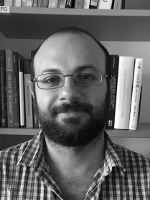Dr. Mohammad Magout

Areas of interest
- The Arabic press in the 19th century
- Secularity in the Arab world
- Sociology of Islam
- Contemporary Ismailism
Situating Religion: Formations of Secularity in the Nineteenth-Century Press in Beirut
Broadly speaking, this research project examines the private Arabic press in Beirut in the second half of the 19th C as a major vehicle for the development of modern Arab discourses about religion and its relevance for social, cultural, and political spheres. The focus is twofold: the contents of the press as well as its role as a modern medium of communication that contributed to the formation of a trans-regional and trans-confessional Arab public sphere. The project examines four periodicals with different confessional backgrounds and political orientations: al-Jinān (founded in 1870 by Butrus al-Bustani and edited by his son Salim), Thamarāt al-Funūn (established in 1875 as the first private Muslim periodical in the Arab world), al-Bashīr (founded in 1870 by Jesuit missionaries), and al-Nashra al-ᵓUsbūᶜiyya (established in 1871 by American Protestant missionaries). Furthermore, it deals with interactions between these periodicals and other contemporary periodicals in the region in order to provide a broader picture of discourse about religion in the Arabic press during its early years. The goal of the study is to contribute to the historicization of conceptions of secularity in late Arab-Ottoman thought in light of concrete social and political developments at the local (Beirut, Mount Lebanon), regional (the province of Syria), and transregional (Ottoman, Mediterranean) levels.
The starting point for inquiry in this research project is the question of secularity: How did religion come to be perceived as a distinct social sphere or institution and how it was related to other markers of identity, belief systems, and cultural institutions? What were the social, political, and cultural developments that led certain groups to argue for some form of separation between religion, on the one hand, and some other social sphere—such as politics, the economy, science, or culture—on the other? Alternatively, which groups argued against such separation and called for religion to be the dominant social and political framework? Which conceptual repertoire and intellectual resources were employed in such debates?
My own research project addresses these questions in late nineteenth-century Arabic periodicals by examining how, when, and under which circumstances some primary concepts of modern Arab social thought, such as siyāsa, hayᵓa ijtimāᶜiyya, madanī, and jinsiyya, were contrasted or related to concepts that came to be associated with ‘religion’ (e.g. dīn, madhhab, ḍamīr, or rūḥī). Additionally, it seeks to shed light on the periodicals as clusters of relations and interactions between individuals (producers, distributors, as well as consumers) that were embedded in different social, religious, and geographic settings. The goal is to determine the reference problems—i.e. the specific political and social conflicts, whether local, regional, or global that generated debates about the relationship between religion and other spheres—and the guiding ideas that served as a framework for analyzing and solving these problems.
Biography
Senior Researcher, HCAS "Multiple Secularities - Beyond the West, Beyond Modernities"
Visiting Postdoctoral Fellow, Orient-Institut Beirut (Lebanon)
Doctoral dissertation thesis defended, Institute of Oriental Studies, Leipzig University (Germany)
PhD Candidate, Research Training Group „Religious Non-Conformism and Cultural Dynamics“, Leipzig University (Germany)
MA Muslim Cultures, Institute for the Study of Muslim Civilisations, Aga Khan University, London (UK)
BA Mathematics, University of Damascus (Syria)
Relevant Publications
- Magout, Mohammad. A Reflexive Islamic Modernity: Academic Knowledge and Religious Subjectivity in the Global Ismaili Community. Würzburg: Ergon Verlag, 2020.
- Magout, Mohammad. “Secularity in the Syro-Lebanese Press in the 19th Century.” In Companion to the Study of Secularity. Edited by HCAS “Multiple Secularities – Beyond the West, Beyond Modernities”
- Magout, Mohammad. “Transnationalizing Multiple Secularities: A Comparative Study of the Global Ismaՙili Community.” In “Islamicate Secularities in Past and Present.” Edited by Markus Dressler, Armando Salvatore and Monika Wohlrab-Sahr. Special issue, Historical Social Research 44, no. 3 (2019): 150–79.
- Magout, Mohammad, and Julia Heilen. “Conference Report: Workshop Muslim Secularities: Explorations into Concepts of Distinction and Practice of Differentiation, Leipzig University (18–20 June 2017).” Zeitschrift für Recht und Islam 9 (2017): 326–29.
- Magout, Mohammad. “Ismaili Discourse on Religion in the Public Sphere: Culture as a Mediating Concept,” in Muslims in the UK and Europe. Edited by Yasir Suleiman, 140–49. Cambridge, 2015.


